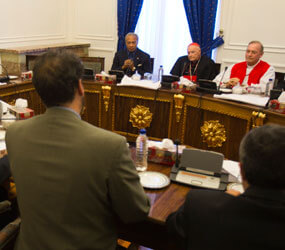WASHINGTON – A delegation of Christian and Muslim leaders returned to the United States from Iran hoping that their six-day visit will improve relations between the two squabbling countries in a way that diplomatic channels have not.
The four-member delegation, which included Cardinal Theodore E. McCarrick, retired archbishop of Washington, also hoped to be accompanied on the return home Sept. 19 by a pair of American hikers still being incarcerated by Iranian authorities on charges of espionage and entering Iran illegally, but was sidetracked because a judge who could approve their release was on vacation.
Addressing reporters at Dulles International Airport outside of Washington upon the delegation’s return, Cardinal McCarrick said the release of Shane Bauer and Josh Fattal was imminent. He said he planned to call the mothers of the hikers as soon as he could get to a telephone to assure them that “their sons are on the way, so hang in there.”
Bauer, 29, and Fattal, 29, began serving an eight-year prison sentence in August after being accused of being CIA agents and convicted of the charges in a trial. Negotiations with the Iranian judiciary for their release moved ahead as the delegation met Sept. 13-18 with Iranian religious and government leaders including President Mahmoud Ahmadinejad. The judge who could sign off on the deal was expected to return to work Sept. 20.
A third hiker, Sarah Shourd, Bauer’s fiancée, also was arrested as the Americans hiked along the unmarked mountainous Iran-Iraq border July 31, 2009. She was released in September 2010 for humanitarian reasons by the Iranian government.
The trip to Iran was the most recent for Cardinal McCarrick and Bishop John Bryson Chane of the Episcopal Diocese of Washington. Cardinal McCarrick began visiting Iran under the administration of President Mohammad Khatami between 1997 and 2005. Bishop Bryson has visited Iran since 2006.
They were joined by Niha Awad, executive director of the Council on American-Islamic Relations, Larry Shaw, chairman of the council’s board, at the invitation of Ahmadinejad.
The trip was arranged with the help of officials at Search for Common Ground, an organization with offices in 27 countries that works to prevent and resolve conflict.
“The primary purpose (of the trip) was to try and deepen the relationship between the two countries by direct human contact on the basis of religious leadership,” William G. Miller, senior adviser to the organization who worked in the U.S. embassy in Iran in the early 1960s, told Catholic News Service.
Cardinal McCarrick said he believed the discussions among Iranian and American religious leaders would deepen trust where diplomacy has failed. He said the idea of establishing a bilateral commission of religious and academic leaders from both countries was offered during the one-hour meeting Sept. 17 with Ahmadinejad.
“The political channel doesn’t do too well right now. There should be another channel. The other channel is the religious channel,” the cardinal said.
Bishop Chane said he welcomed the idea for the commission “to begin to deal with issues that our politicians and folks in the State Department and their (Iran’s) foreign minister have not been able to deal with.”
The two countries have been at odds over Iran’s growing nuclear energy program and the possibility that it could lead to Iran possessing nuclear weapons. Iran also has thrown verbal barbs at Israel, a key U.S. ally in the Middle East.
Bishop Chane also said the delegation met with families and friends of about 60 Iranians being held by the U.S. government on unspecified charges. He said the families as well as Iranian officials asked them to press the U.S. government to review their cases on humanitarian grounds.
“It would be appropriate if our government responded in kind,” he said. “It would open significant doors.”
All of the delegates said they planned to meet with the State Department in a debriefing about the trip.


